
Valisia LeKae
Valisia LeKae, who made her Broadway debut in the most recent revival of Threepenny Opera, is currently portraying Grammy-winning icon Diana Ross in the new musical Motown, about the life and career of music mogul Berry Gordy, at the Lunt-Fontanne Theatre. And, it's a role for which the young actress, whose Broadway resume also boasts The Book of Mormon and 110 in the Shade, seemed destined. The Memphis native grew up in a household filled with the sounds of Motown, performed Diana Ross hits at school and in theme parks and even played Deena Jones, the character based on Ross in the North Carolina staging of Dreamgirls. Following the first preview of Motown, I had the chance to chat with the charming singing actress about her newest role, which casts her opposite Tony nominee Brandon Victor Dixon as Berry Gordy; that interview follows.
Question: Since we haven't spoken before, let's start at the beginning. Where you were born and raised?
Valisia LeKae: I was born in Memphis, TN, and raised in Memphis, TN.
Question: When did you start performing?
LeKae: I started very early on in the church—in African-American churches and things like that. We have things like the Sunshine Band, and so I think it was probably around the time when I was six when I started singing in church, and then from there, it went from elementary school to different programs and wherever else they would have me! [Laughs.]
Question: Who were some of the musicians or artists who influenced you growing up?
LeKae: A lot of gospel artists and R&B as well. I grew up listening to, not just Motown, but Tramaine Hawkins and Sam Cooke, which was on repeat in my household, [also] Aretha Franklin. My mother is a big lover of music, and so when we played a song, it would probably repeat ten times before we went to the next track. [Laughs.] But we got used to a lot of that—Sam Cooke and Aretha and Motown as well—so I had a vast array of artists going through our repertoire in the household.
Question: When did performing change from a hobby or something you did at church to when you knew it was going to be your career?
LeKae: Well, I did it for a while, and it was something that I truly, truly enjoyed, and I loved to see people respond in a certain way to a performance, whether they were singing with the song or smiling or crying. I went through a phase where I was doing it in church and then in elementary school and whatever we had in high school, but I was also performing at the local theme park when I was in high school… So there was one day—I think I was doing something on stage—and I saw this woman's face, and she had such joy in it. Because up until that point, I was just doing it. It didn't matter to me whether or not I got paid for it, but when I saw the look in her face and how much joy I could bring to her just by doing something that I love, I knew at that moment, "Okay, this is exactly what I wanted to do," and then I thought, "And, they're going to pay me for it? Let's do it!" [Laughs.] So, for me, it was just that moment of seeing somebody so happy and knowing that I could be a part of that. It really changed my life.
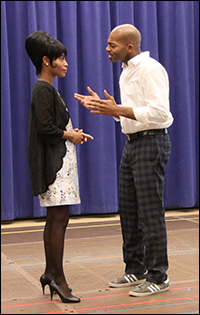 |
||
| Brandon Victor Dixon and LeKae perform at a Motown press event. |
||
| photo by Joseph Marzullo/WENN |
LeKae: I had been doing different singing and theatre gigs, but when I was in college—even though I knew I wanted to be a singer—it just wasn't concrete enough. My grandmother, I lived with her when I was in high school, and she is an educator—she's a teacher—so I had to go to school to get something solid. So I got my degree in Psychology and my minor in Child and Family Studies, but while I was there, I did whatever I could to perform, so the first couple of years, I was a mascot. The next couple of years—my junior year and senior year—I performed at Dollywood, so I would take 18 semester hours and travel on the days I wasn't in school to perform there. And, when I graduated, I knew I was coming to New York. I didn't know what I was going to do. I didn't have a plan. I was just like, "I'm going to New York with the little money that I have." [Laughs.] So I remember on graduation day—and I still have my cap—but I stoned "NYC" on the top of it, and when I finished Dollywood that season, I ended up auditioning for the USO, and I remember having submitted my information too late, so I was a little disappointed. And then [the woman running the USO auditions] called me back, and she [said], "You know, I loved your tape, but I'm going to still have you come in," so I went to New York sometime to audition and then got down to the last five. Once I got to that audition, I wasn't coming back home. It ended up that three of us out of the five got the job, and I needed to move to New York—which was my plan anyway—but I didn't have a place to stay, and I only had $200 in my pocket, and I thought those stories were sort of like urban legends. [Laughs.] But I really did have only $200 in my pocket and not a place to stay, and one of the girls who ended up being in the troupe with me said, "I have this great place in Astoria. I'm always at my boyfriend's place, so you can always stay there, and when I'm home—the little time that I am—you can sleep on my couch," and it just worked out perfectly because, for half the rent, I had a really beautiful place to stay. And, I never looked back. And, it has just been one blessing after another from there.
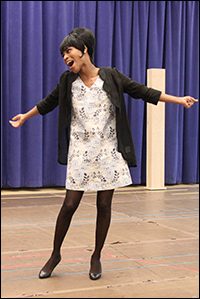 |
||
| Lekae performs at a recent press event. |
||
| Photo by Joseph Marzullo/WENN |
LeKae: My Broadway debut, which I really, really loved was Threepenny Opera, and I was very fortunate because Broadway, for me, has served as a sort of conservatory because I did not go to school for this, so I had to learn the ropes of really honing my craft on the Broadway stage. So the people who were in my show were legends of legends. I got to work with Cyndi Lauper, who I grew up listening to her music. And, I was the dance captain of the show, so to work with her side by side, and Alan Cumming, who is amazing at what he does every time he hits the stage. I was so thrilled, and I learned a lot from him. And, Ana Gasteyer, who was an "SNL" alum and an amazing singer, which on "SNL" you really see her do all this funny stuff, and you don't really get to really see her, but this woman has a voice like no other, and Nellie McKay, who was very, very new to the Broadway stage, but one of the smartest, most gifted people that I know. And, she is such a woman of class, and I love her because of her style and the way she is. She's very unique, and she loves vintage clothes, and so did I. I just fell in love with her. And then there was the epitome of all—Jim Dale. To watch this man work at his age—I may be wrong, but I think he was 70-something when we were doing this. He had the most energy probably out of us all! He is a professional at best. He is everything and more, and I watched him work, and I thought, "Okay, there's no way that God could have put me in a better place to learn about theatre than this show right now." And, he was also doing the characters of the "Harry Potter" series at the time because he does the books. I remember one day walking into his dressing room, and he had his legal pad and like 100 different characters on them, and just being very diligent about his work and everything with this show and that. I thought, "Oh my God, I will never get a chance like this again," and then I got into my next Broadway show, [110 in the Shade], and then Audra McDonald showed up! [Laughs.] I feel like I got the best teachers along my journey, especially with my first show because it was a bit of music people coming together doing the stage…and I got a really amazing lesson, and it just got better and better from there on.
Question: You were also in Book of Mormon…
LeKae: Yeah, before this show I was in Book of Mormon, which was an experience like no other. I came into this show a month or so after they opened, and they weren't releasing the scripts or anything, so when you auditioned for it, you didn't know what you're getting into. And, I heard all these stories about everything. So when I got to it, I remember seeing it, and I thought, "Oh my God, I wish everyone in the world could experience this right now." For two-and-a-half hours I forgot about everything. I cried laughing, and I remember there was someone in my life at that time who was going through something. She had cancer, and she was dying from it. And, I thought, "If she could see this show"—and I know it sounds extreme—but I thought, "If she could see this show and laugh"—excuse my French—"her ass off, for two-and-a-half hours, everything could just be washed away." And, that show did so much for me because it was so funny and so brilliantly written, and what those guys did…working so hard at getting that script together and starting from 26 pages and getting what they did to happen on that stage, and those two leads—Andrew [Rannells] and Josh [Gad]—carrying that show and being so amazing, and Nikki [M. James], whom I've admired for years, just being the beautiful soul that she is on and off stage. I really was in heaven. And, to have my year to experience that. It was out of nowhere for me. I just couldn't have asked for a better experience right before this one.
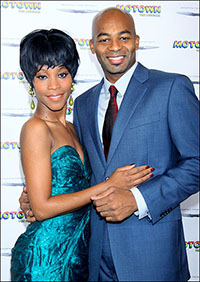 |
||
| LeKae with co-star Brandon Victor Dixon |
||
| photo by Joseph Marzullo/WENN |
LeKae: Motown came about in January of 2011. I heard about them having auditions for this show, and I remember e-mailing or calling my agent and saying, "You have to really get me in for this because, you know, I am Diana Ross." [Laughs.] And, they're like, "Okay. I hear auditions are coming soon," so I was like, "Okay." I gave him a week, and I think by then he emailed me the sides and what the character breakdown was, and I immediately went into my obsession with trying to find out everything, and I had my one audition with the director and the musical director at the time, and he was looking at me and saying, "Are you doing something with your voice because you have all these 'isms' and you sound like her?" And, after that audition, I know they called my agent… I can't remember if I went in again or not, but I remember it being sort of an easy process because it's rare that we get those. Most times, I hear stories where people have gone in seven times, but it wasn't like that, and I remember talking to my agent again, and I was reading a page [from the musical], and I was like, "I'm reading page number whatever, and I am this woman, so when you call me back just tell me I got the job. That's all I want to hear from you from here on out!" [Laughs.] So when he did call me when I got the job, I remember being on Eighth Avenue and just jumping and screaming and being so happy, and I remember before we started the reading, the director, Charles [Randolph-Wright], called me because he was at my first theatre audition ten-plus years ago, and it was sort of kismet how we were reunited with this process, and that was two years ago. And, yesterday, we—I'm about to cry saying it—but yesterday, two years later, we finally got to bring it to the Broadway stage, and it has been a labor of love, but, my God, I can't imagine any other way I would've been spending my last two years. Question: What was your history with Diana Ross in terms of being a fan and knowing her music? How far back does that go for you?
LeKae: It goes back to when I was a very little girl because we played her albums. We played albums of Motown—the Jacksons! Anybody and everybody… Marvin Gaye. We played Motown in our house. My grandfather also had a salon where he played it in his salon because he had a jukebox, and he still has that jukebox until today, and my mother bought the albums for that—the 45s for the jukebox—so I would go to Pop Tunes Record Store with her and go down the aisles. At that time, you could pick an album and play it on the store's jukebox to listen to it, so I remember that very vividly. It was everywhere, so growing up I remember doing some of Diana Ross' songs. I remember when I was in junior high or high school, I did the "T.C.B." medley for the local state fair, and I remember having two white girls as my backup singers. We did "T.C.B. Stop whatever you're doing. Hold it right there…" and had black dresses with the white rhinestones on it, and I remember that. And, I used that same medley for the women's choral audition at my university—didn't get in, but who cares! I did that medley anyway, and I remember doing it in my high school for an Omega Psi Phi scholarship, and then winning the regional and going onto the state and winning with that medley, and being at Dollywood and performing "Stop in the Name of Love," and being at Libertyland in high school—my local theme park—and not only playing Diana Ross, but I went from one number playing Diana Ross, singing "Ain't No Mountain High Enough," to turning around, doing a quick change, and doing a Jackson Five medley, playing Michael Jackson. [Laughs.] I went from the long hair to the afro in a matter of five minutes. Everything in my life has sort of prepared me for this moment, even when I didn't realize it was happening, and I look back on my life, and it's sort of crazy.
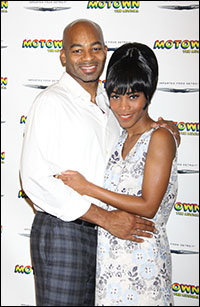 |
||
| Brandon Victor Dixon and Valisia LeKae |
||
| Photo by Joseph Marzullo/WENN |
LeKae: I did. That came about very weird because I remember auditioning for North Carolina Theatre, which is one of the theatres that I love, and going in for [the role of] Lorrell, and having that whole audition process be about Lorrell, so when my agent called me, he said, "Hey, you got the job for the North Carolina Theatre, but they want you to play Deena Jones." Not that I had a problem with that, but I didn't read for Deena Jones, I didn't sing for Deena Jones… He said, "No, they really want you for Deena Jones." That was another experience where it wasn't a difficult audition… And, what was so great was that we got to use the original Dreamgirls costumes, so we got to use the costumes that were in the Broadway show, and I could look at the back of my tag and see "Sheryl Lee Ralph"! And people over the years who were in those outfits, [including] Terry Burrell, who was in my first Broadway show… I was in one of her outfits. I could see those outfits, and we got to use the fur and everything from the original Broadway production, and for two weeks, we were living! We were living on the stage, and it was such a great production, and such a great town with a wonderful cast, so I got very lucky with that one.
Question: For Motown, how did you go about approaching playing Diana Ross? Did you want to imitate her sound? What was your thinking?
LeKae: No, I can definitely tell you that I'm not doing an imitation of anything. If you asked me to do an imitation, it would probably suck because I wouldn't even know how to go about approaching that. [Laughs.] I wanted to make her as human as possible because being in this business, [people] can come off larger than life and big icons and untouchable and so many things, and people forget that they're just like us. Stars are just like us—they're human, they cry, they get upset, they laugh, they do all sorts of things, they make mistakes. So I wanted to really approach her in that manner because, to me, that's who she is. After reading so much about her, I found so many things that were alike…growing up in the church just like she did and singing, and sort of wanting to be a dancer when I was younger, and the thing about love—wanting to share it and give it. That, to me, is such an important part of her journey, not wanting to let her fans down and wanting to serve her purpose in this world and also give the people everything that they wanted. She got to be such a songstress and a storyteller through her journey, and I really wanted to emote all of those things. I don't do an imitation of her. I'm an actress, and I study my craft to portray this woman in a way that people would understand her, and I would hope that she would be proud. She started off when she was 15, and she was an unknown, and then she became this woman, this person, this icon. I am an unknown and Motown is so larger than life—it's something that everybody experienced through their lifetime—I can sort of bring my own life into this role of…taking this journey with her and understanding it. So it wasn't very difficult for me to channel her because we're sort of going on kind of the same journey… When I go on that stage, and when I'm performing and entertaining for people, there is nothing else I'd rather be doing because the people—for two-and-a-half hours—are removed from everything that could possibly be wrong or right in their life, and for that moment, they are laughing and living and loving and crying, and I get to be a part of that, and I think that was something that was so important to her. Question: Because I haven't seen it yet, is there much of a book to the musical or is it more a concert?
LeKae: Oh, yeah. There is definitely a story because Mr. Gordy has a lot to say. I mean, along with the music and the stuff that he does, he's got so many things in his life that I don't think people know about, and how he got there, and the struggles that allowed him to get there—the ups and downs. The love story between the two of them is really told throughout this play. We get to see him from a very young age experiencing the night that Joe Lewis won the fight, and how that affected him and his family, and we get to experience that and how that sort of set a spark in him—how his father taught him, "You can do whatever you want to do, just be yourself," and "You don't have to be anyone else, and do what you love." And so he takes us there—from the '30s to where Joe Lewis won that fight. And, he was working in an auto plant to being a boxer and…those things really didn't stick for him until he became a songwriter, and then he found what his true calling was, which was loving and entertaining and educating artists and being this songwriter. He goes from a very young age—I think he's about eight—until 1983 when he's in his 50s, so we get a long journey with Mr. Gordy and his story, but yes there's a book. There's a love story between he and Diana, there is his growth throughout the company, and then you see all of these other people—these established other people: The Temptations, The Supremes, Martha and the Vandellas, Marvin Gaye and Smokey Robinson… It really is a journey.
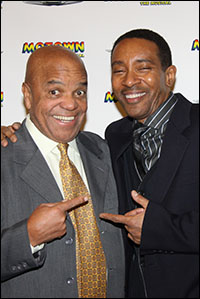 |
||
| Berry Gordy and Charles Randolph-Wright |
||
| Photo by Joseph Marzullo/WENN |
LeKae: Oh! [Laughs.] Oh, yes. Berry Gordy, Jr. has been at every rehearsal since Day One. He has been a part of this process since Day One. We talk extensively. Brandon [Victor Dixon] and I went out to his house in L.A. after we did the first reading… I'd gotten so comfortable with him that I felt like I was home. I felt very comfortable being there. I'm very comfortable with him. I love him madly, truly, deeply, and I love spending time with him, and throughout the rehearsal process he was there. He was very much a part of this. I remember this story… We were at his house in L.A., and we were going to watch videotapes—and I had done my research on a lot of the things that [Diana Ross had] done—so we were sitting in his movie screening room, and he starts to play a series of things, and before they would start or the second they would start, I would know every particular place, where they were, what she was wearing, what she was going to sing, and he looked at me and was like, "Oh! You actually know what you're doing?" And, I said, "Of course! I'm sitting here with Berry Gordy. I have to know something!" But we would have conversations, and I wanted to make sure that I came in with the knowledge so that when I got with him I would not be wasting his time. I had so much to ask him, and I remember he'd say to me, "Who are you? Barbara Walters?" [Laughs.] Because he would be like, "You know so much, and you're asking me so many questions." But he was that available to us. We all got to meet with him the first time we did the reading, and now when we see each other, we're like old friends. We talk about everything, and we're very comfortable. I share my heart with him, and he's in that script every single day, and for this man to be 83 years old, he has so much energy, and I really don't understand how he does it because at the end of the day I am so tired, but he's like, "Let's go again!" So he is there, and I really want people to know that he is working very hard, and he has been there since Day One. He is not removed from the process; he is the process, and he allows it to be a part of him, and he is working very hard to serve the people, and he wants it to be the best. Even after last night—I was with him—he was like, "On this, you can do this better, and you can sing this, and you can bring the people in here, and reach out and…" I was like, "Berry, it's midnight, and you have too much energy for right now," and he was like, "No, no… We just continually want to make it better because I want this to be the greatest thing ever," and I truly believe that he does, and he will make that happen.
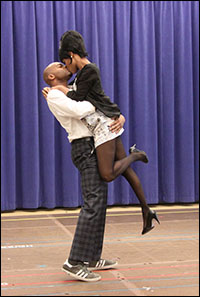 |
||
| Brandon Victor Dixon and Valisia LaKae |
||
| photo by Joseph Marzullo/WENN |
LeKae: You know, it's weird because once you go into the zone, there's a lot of things I don't remember, but I don't come on stage until like 20 minutes into the show… I remember hearing the crowd cheer once someone was introduced as Smokey Robinson and Marvin Gaye, which happens at the very top of our show. The people were cheering as if Smokey Robinson and Marvin Gaye showed up on stage… A lot of us aren't big, mega superstars or five-time Tony Award winners. We aren't that, but the fact that the audience was with us from the start of the music, and when they saw the people who were portraying Marvin Gaye and Smokey Robinson—to know that they were worthy enough already to receive an applause on entrance—was crazy to me. I don't know if that's going to happen every day, but to have that moment, at that moment—listening to it from backstage—it was such a blessing. From what we got from the audience at the end of the show—the applause—and people seemed very happy, loving the music throughout, and laughing and everything and singing along, and, from what I hear from the ushers, dancing in their seats or in the aisles, I think we're on our way to something great.
Question: What would you think if Diana Ross came to the show?
LeKae: Well, for me, I said to myself, "When we start performances, to me, every night Diana Ross will be in that audience." I will never allow myself to think Diana Ross is not in the audience, but I think she would be so proud of Berry and so happy for him. Having Suzanne de Passe there last night, she was so emotional, and she's a good friend of Diana's, she was so emotional and so proud. I think [Ross] will share the same sentiment—she has such a great love for this man and such a great love for what he's done for her and everybody else that she would be proud of what he's put on the stage, and I think she would be happy with everything. And, I would hope that for her, but I truly adore and love her and love what she's done for so many people that I want to be as honest with my performance, and I would hope that she would recognize that.
[For tickets visit Telecharge.com. Visit MotownTheMusical.com.]
Well, that's all for now. Happy diva-watching! E-mail questions or comments to [email protected].









